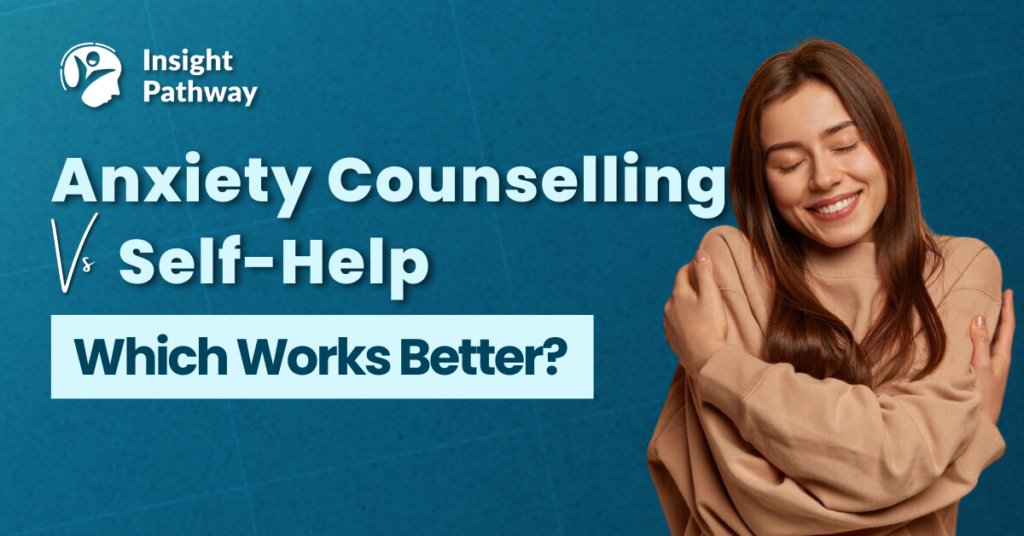If you’ve ever felt stuck in a cycle of anxious thoughts, you might have turned to self-help strategies like journaling, meditation, or deep breathing. While these tools provide temporary relief, lasting change often requires deeper intervention. That’s where anxiety counselling makes all the difference, offering professional support that goes beyond surface-level fixes.
In this blog, we’ll explore the differences between self-help and professional counselling for anxiety and explain why combining both approaches creates the most effective path to mental wellness.
Understanding Anxiety: Why Self-help Alone May Not Be Enough
Anxiety is more than just occasional worry or stress—it’s a complex emotional response that can affect your thoughts, emotions, and physical well-being.
The Role of Self-help for Anxiety
Self-help strategies like journaling, guided meditation, or mindfulness apps are popular ways to manage anxious thoughts. They provide immediate relief, helping you calm your mind during stressful moments.
For instance, practicing mindfulness or taking a walk can be effective distractions from racing thoughts. These tools are easily accessible, empowering you to manage your anxiety independently in daily situations.
However, self-help for anxiety has its limitations:
- It focuses primarily on symptom management rather than addressing root causes.
- It’s harder to identify and change deeper thought patterns without expert guidance.
While self-help is invaluable for day-to-day management, it’s often not enough for those experiencing chronic or severe anxiety.
Why Anxiety Counselling Makes a Difference
Professional counselling offers more than temporary fixes—it provides a structured, tailored approach that targets the root causes of anxiety. Here’s why anxiety counselling stands out:
1. Personalised Support
Every person’s anxiety is different. With counselling, a trained therapist creates a customised plan tailored to your unique needs and challenges. Using techniques like cognitive-behavioural therapy (CBT) or acceptance and commitment therapy (ACT), you’ll learn strategies designed to address your specific triggers.
This individualised support makes counselling far more effective than generic self-help solutions.
2. Uncovering Root Causes
Anxiety often stems from unresolved issues like past trauma, ingrained thought patterns, or chronic stress. Counselling provides the safe space and professional insight needed to explore these deeper causes.
For example, a therapist might help you identify how childhood experiences contribute to current anxious feelings or why certain situations consistently trigger stress. Understanding these connections is key to achieving long-term relief.
3. Accountability and Guidance
Unlike self-help techniques, counselling offers ongoing support and accountability. Your therapist helps you set realistic goals, track your progress, and stay motivated throughout your mental health journey.
This guidance ensures you stay on track, making it easier to develop and maintain habits that support mental wellness.
4. A Judgment-free Space
Anxiety can feel isolating, especially when it seems like no one truly understands your experience. In counselling, you’re given a safe, confidential environment where you can openly express your thoughts and feelings without fear of judgment.
This emotional release can be incredibly healing, helping you feel validated and supported.
5. Building Long-term Resilience
One of the greatest benefits of counselling is the long-term skills you gain for managing anxiety. For example:
- CBT techniques teach you how to reframe negative thoughts.
- Mindfulness-based therapies help you observe your emotions without feeling overwhelmed.
These tools empower you to handle future challenges with confidence, ensuring you’re better equipped to manage anxiety in the long run.
Blending Self-help with Counselling for the Best Results
While self-help provides excellent tools for day-to-day anxiety management, counselling offers the depth and structure needed for lasting change. Together, they form a balanced approach to mental wellness.
How the Combination Works
- Self-help for anxiety: Use strategies like journaling, meditation, or breathing exercises to calm your mind during stressful moments.
- Counselling: Work with a therapist to uncover triggers, develop tailored coping mechanisms, and address deeper emotional issues.
For example, you might practice mindfulness to manage a panic attack in the moment, while regular counselling sessions help you understand what triggers these attacks and how to prevent them in the future.
At Insight Pathway, we connect individuals with experienced professionals who can guide them on this journey. By combining professional counselling with self-help, you’ll build a well-rounded toolkit to handle anxiety effectively.
Conclusion
Managing anxiety is a deeply personal journey, and there’s no one-size-fits-all solution. While self-help strategies are invaluable for daily management, anxiety counselling provides the insight, structure, and tools needed for long-lasting relief.
By blending counselling with self-help practices, you’re equipping yourself to face anxiety with resilience and confidence. It’s an investment in your mental health services and well-being that allows you to live a fuller, more empowered life.
Take the first step today—explore mental health services to uncover how professional guidance can transform your relationship with anxiety.


